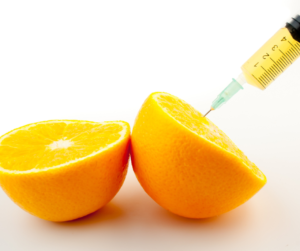Vitamin C Injections

Vitamin C injections, also known as ascorbic acid injections, are a form of vitamin C supplementation that is delivered directly into the bloodstream through an injection. Vitamin C is an essential nutrient that has many important roles in the body, including supporting the immune system, promoting collagen formation, and acting as an antioxidant.
When administered via injection, vitamin C is quickly and efficiently absorbed into the bloodstream, bypassing the digestive system. This can be particularly beneficial for individuals who have difficulty absorbing vitamin C through their digestive system, such as those with malabsorption issues or certain medical conditions.
Potential benefits of vitamin C injection:
Boosts immune system: Vitamin C is known for its immune-boosting properties. Vitamin C injections can help improve immune function, making it easier for your body to fight off infections and illnesses.
Promotes collagen production: Vitamin C plays a key role in the formation of collagen, which is essential for healthy skin, hair, and nails. Vitamin C injections can help promote collagen production, leading to healthier skin and nails.
Acts as an antioxidant: Vitamin C is a powerful antioxidant that helps protect cells from damage caused by free radicals. Vitamin C injections can help reduce inflammation and oxidative stress, which can lead to a variety of health problems.
Improves iron absorption: Vitamin C can enhance the absorption of iron from plant-based sources. Vitamin C injections can be particularly helpful for individuals with iron-deficiency anemia who have difficulty absorbing iron through their digestive system.
Supports wound healing: Vitamin C is involved in the production of new tissue and the repair of damaged tissue. Vitamin C injections can help improve wound healing and reduce the risk of infection.




Why is vitamin C important?
Vitamin C, or ascorbic acid, is a water-soluble vitamin with important functions in the human body. We need vitamin C for collagen biosynthesis, but also the synthesis of l-carnitine and some neurotransmitters. This micronutrient is also necessary for the metabolism of protein. Additionally, vitamin C functions as an antioxidant.
Antioxidants neutralize free radicals and protect us against oxidative stress and damage they would cause. Free radicals speed up the aging process, may contribute to the development of cancer, cardiovascular disease, and other health problems.
Moreover, we need vitamin C for strong immune system defenses. What many people don’t know is that vitamin C improves absorption of nonheme iron, the form of iron present in plant-based sources.
What does the injectable vitamin C do?
Vitamin C injection benefits abound. Chief among them is its ability to contribute to one’s long-term health and wellness while being a viable preventive treatment.
Since vitamin C injection benefits include reduced nausea, regulating appetite, and relieving acute and chronic pain. Concentrated vitamin shots can significantly improve your quality of life including removing continual tiredness and fatigue, which are so common amongst busy working and family lives.
Furthermore, vitamin C plays a role in your brain’s health because it is a vital ingredient for producing neurotransmitters. It is also given as a preventive supplement against the common cold, asthma, flu, cancer, age-related macular degeneration, osteoarthritis, and COVID-19. While it does not stop you from getting these illnesses and conditions, it does give your body a better fighting chance of overcoming or managing these medical conditions.
Additionally, vitamin C has powerful antioxidant properties that protect our cells against free radicals, aid in tissue growth and repair, and even assist in the production of anti-stress hormones.
Like the vitamin C tablets we are all familiar with, the injectable version contains the same antioxidants and anti-aging benefits. Unlike oral intake, however, it is markedly more powerful and results in higher concentrations of the vitamin being found in the blood as it delivered immediately into the blood stream and through the arteries. Supplements are digested into, and through, the digestive system. Eighty-five percent of the vitamin C taken orally is said to be lost when taken orally. It is then lost quickly through the lymphatic system and excreted naturally. It is much gentler on the stomach when your body metabolises it.
Is injectable vitamin C better than oral supplementation?
The dietary supplement industry keeps expanding and gives us easy access to all sorts of products to support our general health and wellbeing. Stores, online and physical, have a wide selection of vitamin C supplements under their belts. It’s easy to think the use of supplements is a more convenient way to increase vitamin C levels, but the reality is different.
Injectable vitamin C could be more practical for you due to easier and faster absorption. Oral supplements need to go through a long digestion process before they reach the bloodstream. However, injections bypass the digestive system and go straight to your bloodstream. Plus, studies show intravenous administration of vitamin C achieves 70-fold higher blood levels of this vitamin than the highest tolerated oral dose. The body receives only about 15% of the actual vitamin from the oral administration route.
Symptoms of vitamin C deficiency
The signs of a Vitamin C deficiency can vary from person to person, but they may include one or more of the following:
- Rough, dry, damaged, bumpy skin
- Unexplained weight gain
- Easy bruising
- Fatigue, poor mood
- Bright red hair follicles
- Chronic stress and inflammation
- Fingernails spoon shaped with red lines or spots
- Pain swelling in joints
- Tooth loss and bleeding gums
- Slow wound healing
- Poor immune system
- Persistent iron deficiency anemia
The most common risk factors for vitamin C deficiency are unhealthy diet, anorexia, alcoholism, smoking, severe mental illness, and dialysis.
The most significant vitamin C deficiency signs and symptoms include:
Severe deficiency in vitamin C leads to scurvy, but it is uncommon. Scurvy causes weakness, gum disease, skin problems, and anemia. The condition was widely prevalent back in time, but in the modern age, not so much.
Some groups are more likely to be at risk of Vitamin C insufficiency:
- Smokers and passive ”smokers”
- Individuals with limited food Variety
- People with malabsorption and certain chronic diseases
Thankfully, Vitamin C deficiency can be resolved once the Vitamin C levels have been restored.
How long does vitamin C injection stay in your system?
Kidneys control the levels of vitamin C in the blood through a process called renal absorption. The main objective of this process is to ensure vitamin C isn’t lost and expelled from the body through urine.
The process of getting a vitamin C shot is similar to getting injected. The procedure entails minimal to zero pain, as the needle is placed gently into an available muscle. This muscle is commonly found around the glutes under the hip. After getting a shot, you can expect your body’s vitamin C level to remain elevated for three to four weeks.
Vitamins and treatments that are safe to take with this vitamin.
You can be injected with vitamin C while taking other vitamin supplements like biotin, B complex vitamins including vitamin B12, and vitamin D without complications. It can also be safely used in combination with facial and body treatments.
activetherapyclinic.co.uk
